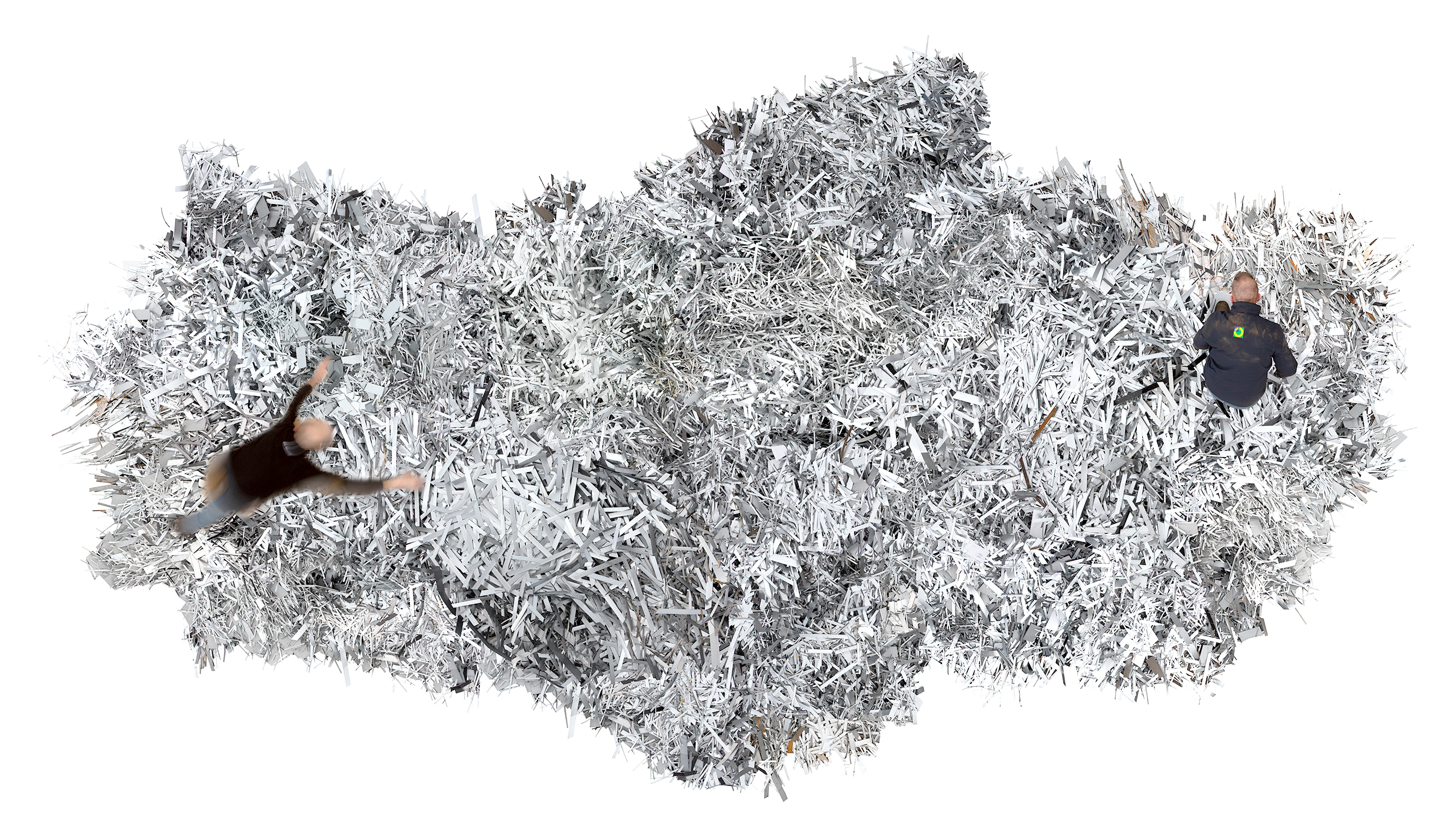Installation view
Art Rotterdam
Fault Lines 2021 Research Symposium
Fault Lines 2020 Research Symposium
Website Research Symposium Fault Lines
Press AD
It is well known that globally we produce a huge amount of garbage but we also generate an enormous amount of image garbage. Every day millions of photographic images are being produced, shared, ignored, discarded and forgotten. The photographic image exists in a state of continual flux. through our increasing deployment of multiple captures, bursts, post-production edits, and our prolific sharing. Currently, it's often not about what we take pictures of, but about the act of taking pictures. Katrin Korfmann's research project centres on the photographic image as waste. Through ‘Wastescapes’, she asks how visual, conceptual and technical aspects of her work as a photographer can be used to critically reflect on the Wasteocene. Her research takes her into the field, to visit numerous waste processing plants, but also deeper into her own practice and her studio, where she experiments with artistic methods to generate other forms of the photographic image, through the juxtaposition and entanglement of waste processing procedures and variants of image production, editing and manifestation.
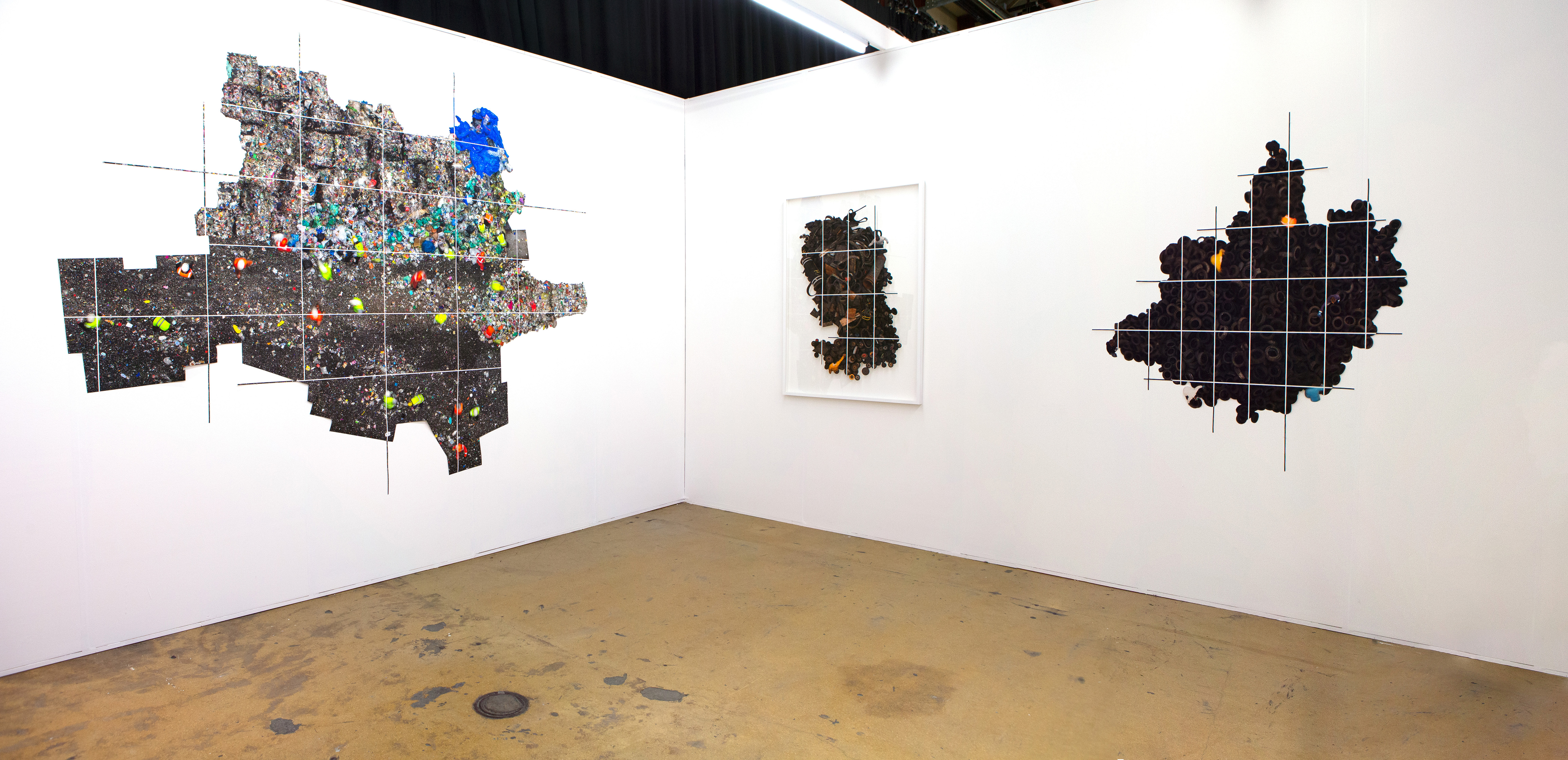
Fast Fashion, Assen
size: 280 x 397 cm, 110” x 156”
material: Hand-cut archival pigment print
year: 2021
Fault Lines 2021 Research Symposium
Fault Lines 2020 Research Symposium
Website Research Symposium Fault Lines
Press AD
It is well known that globally we produce a huge amount of garbage but we also generate an enormous amount of image garbage. Every day millions of photographic images are being produced, shared, ignored, discarded and forgotten. The photographic image exists in a state of continual flux. through our increasing deployment of multiple captures, bursts, post-production edits, and our prolific sharing. Currently, it's often not about what we take pictures of, but about the act of taking pictures. Katrin Korfmann's research project centres on the photographic image as waste. Through ‘Wastescapes’, she asks how visual, conceptual and technical aspects of her work as a photographer can be used to critically reflect on the Wasteocene. Her research takes her into the field, to visit numerous waste processing plants, but also deeper into her own practice and her studio, where she experiments with artistic methods to generate other forms of the photographic image, through the juxtaposition and entanglement of waste processing procedures and variants of image production, editing and manifestation.
Roermond Recycling Plant, Metal Mountain
size: 138 x 110 cm, 54”x 43”
material: Lasercut sublimation print on aluminum
year: 2020
Fault Lines 2021 Research Symposium
Fault Lines 2020 Research Symposium
Website Research Symposium Fault Lines
Press AD
It is well known that globally we produce a huge amount of garbage but we also generate an enormous amount of image garbage. Every day millions of photographic images are being produced, shared, ignored, discarded and forgotten. The photographic image exists in a state of continual flux. through our increasing deployment of multiple captures, bursts, post-production edits, and our prolific sharing. Currently, it's often not about what we take pictures of, but about the act of taking pictures. Katrin Korfmann's research project centres on the photographic image as waste. Through ‘Wastescapes’, she asks how visual, conceptual and technical aspects of her work as a photographer can be used to critically reflect on the Wasteocene. Her research takes her into the field, to visit numerous waste processing plants, but also deeper into her own practice and her studio, where she experiments with artistic methods to generate other forms of the photographic image, through the juxtaposition and entanglement of waste processing procedures and variants of image production, editing and manifestation.
Glass, Lommel
size: 100 x 100 cm, 39” x 39”
material: Lasercut sublimation print on glass
year: 2023
Fault Lines 2021 Research Symposium
Fault Lines 2020 Research Symposium
Website Research Symposium Fault Lines
Press AD
It is well known that globally we produce a huge amount of garbage but we also generate an enormous amount of image garbage. Every day millions of photographic images are being produced, shared, ignored, discarded and forgotten. The photographic image exists in a state of continual flux. through our increasing deployment of multiple captures, bursts, post-production edits, and our prolific sharing. Currently, it's often not about what we take pictures of, but about the act of taking pictures. Katrin Korfmann's research project centres on the photographic image as waste. Through ‘Wastescapes’, she asks how visual, conceptual and technical aspects of her work as a photographer can be used to critically reflect on the Wasteocene. Her research takes her into the field, to visit numerous waste processing plants, but also deeper into her own practice and her studio, where she experiments with artistic methods to generate other forms of the photographic image, through the juxtaposition and entanglement of waste processing procedures and variants of image production, editing and manifestation.
Amsterdam Recycling Plant (The Other Wheel)
size: 130 x 90 cm, 51”x 35”
material: Hand-cut archival pigment print
year: 2020
Fault Lines 2021 Research Symposium
Fault Lines 2020 Research Symposium
Website Research Symposium Fault Lines
Press AD
It is well known that globally we produce a huge amount of garbage but we also generate an enormous amount of image garbage. Every day millions of photographic images are being produced, shared, ignored, discarded and forgotten. The photographic image exists in a state of continual flux. through our increasing deployment of multiple captures, bursts, post-production edits, and our prolific sharing. Currently, it's often not about what we take pictures of, but about the act of taking pictures. Katrin Korfmann's research project centres on the photographic image as waste. Through ‘Wastescapes’, she asks how visual, conceptual and technical aspects of her work as a photographer can be used to critically reflect on the Wasteocene. Her research takes her into the field, to visit numerous waste processing plants, but also deeper into her own practice and her studio, where she experiments with artistic methods to generate other forms of the photographic image, through the juxtaposition and entanglement of waste processing procedures and variants of image production, editing and manifestation.
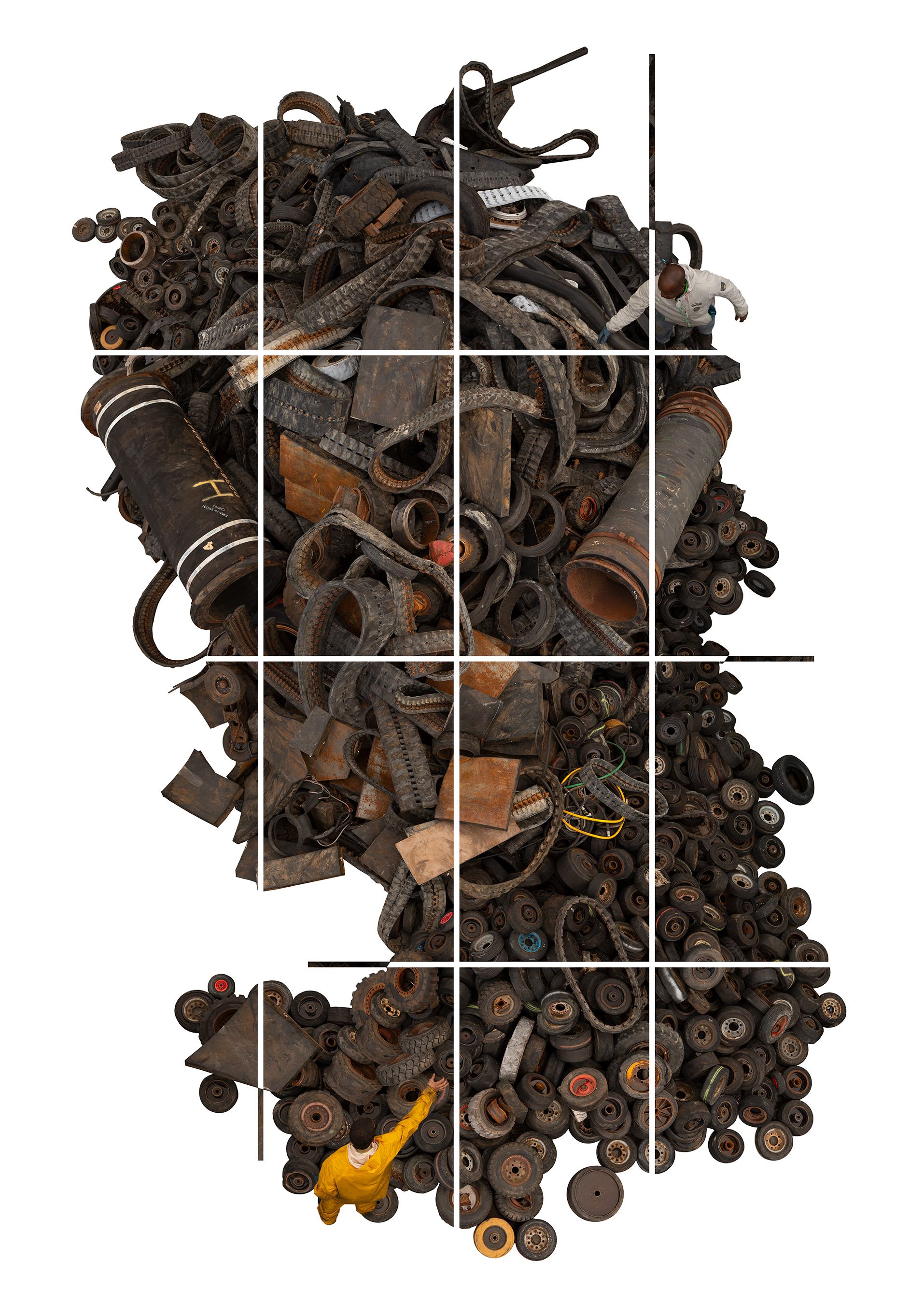
Rotterdam Recycling Plant, Plastic
size: 237 x 300 cm, 93” x 118“
material: Hand-cut archival pigment print
year: 2020
Fault Lines 2021 Research Symposium
Fault Lines 2020 Research Symposium
Website Research Symposium Fault Lines
Press AD
It is well known that globally we produce a huge amount of garbage but we also generate an enormous amount of image garbage. Every day millions of photographic images are being produced, shared, ignored, discarded and forgotten. The photographic image exists in a state of continual flux. through our increasing deployment of multiple captures, bursts, post-production edits, and our prolific sharing. Currently, it's often not about what we take pictures of, but about the act of taking pictures. Katrin Korfmann's research project centres on the photographic image as waste. Through ‘Wastescapes’, she asks how visual, conceptual and technical aspects of her work as a photographer can be used to critically reflect on the Wasteocene. Her research takes her into the field, to visit numerous waste processing plants, but also deeper into her own practice and her studio, where she experiments with artistic methods to generate other forms of the photographic image, through the juxtaposition and entanglement of waste processing procedures and variants of image production, editing and manifestation.
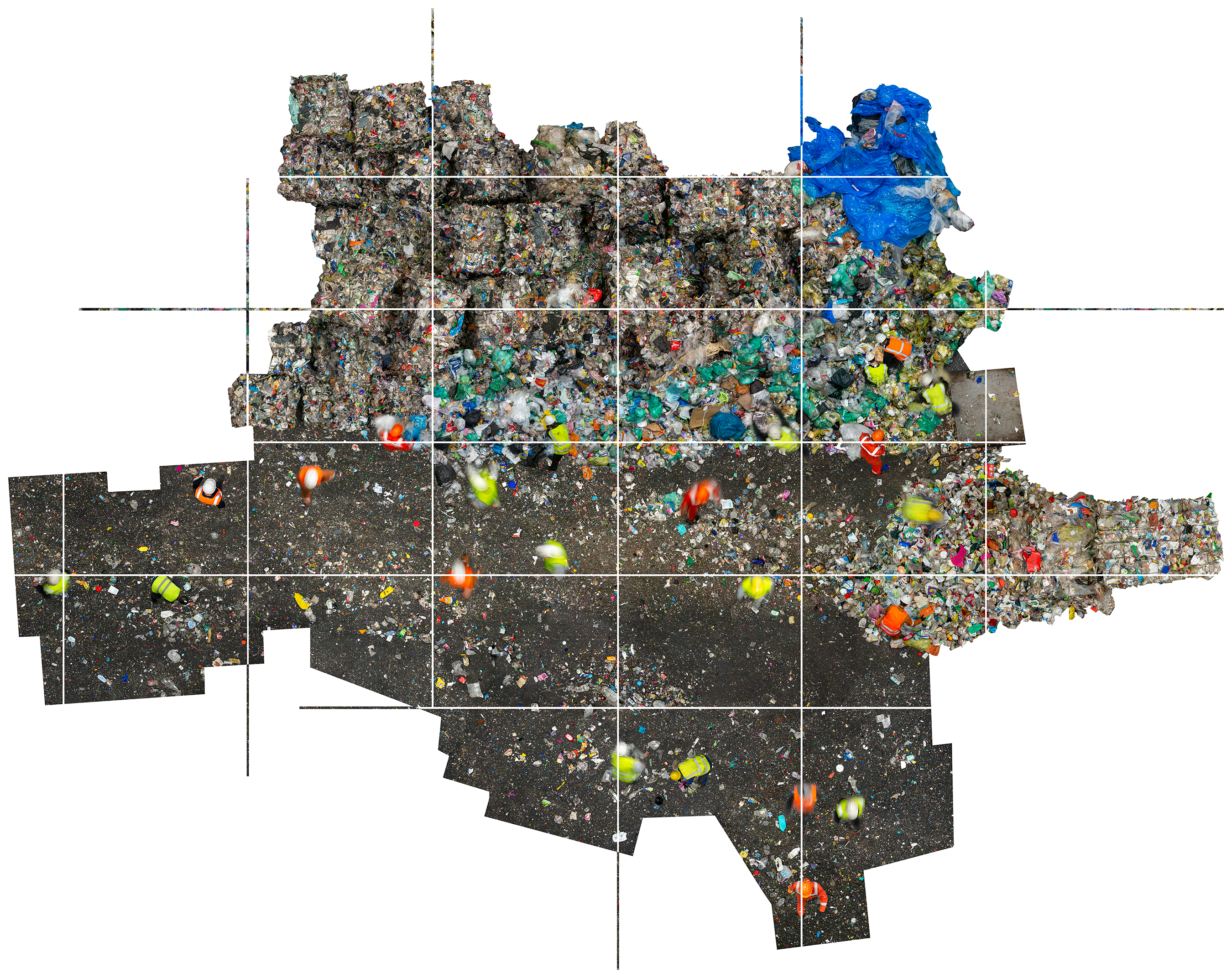
Amsterdam Recycling Plant, The Wheel
size: 150 x 164 cm, 43”x 28”
material: Hand-cut archival pigment print
year: 2020
Fault Lines 2021 Research Symposium
Fault Lines 2020 Research Symposium
Website Research Symposium Fault Lines
Press AD
It is well known that globally we produce a huge amount of garbage but we also generate an enormous amount of image garbage. Every day millions of photographic images are being produced, shared, ignored, discarded and forgotten. The photographic image exists in a state of continual flux. through our increasing deployment of multiple captures, bursts, post-production edits, and our prolific sharing. Currently, it's often not about what we take pictures of, but about the act of taking pictures. Katrin Korfmann's research project centres on the photographic image as waste. Through ‘Wastescapes’, she asks how visual, conceptual and technical aspects of her work as a photographer can be used to critically reflect on the Wasteocene. Her research takes her into the field, to visit numerous waste processing plants, but also deeper into her own practice and her studio, where she experiments with artistic methods to generate other forms of the photographic image, through the juxtaposition and entanglement of waste processing procedures and variants of image production, editing and manifestation.
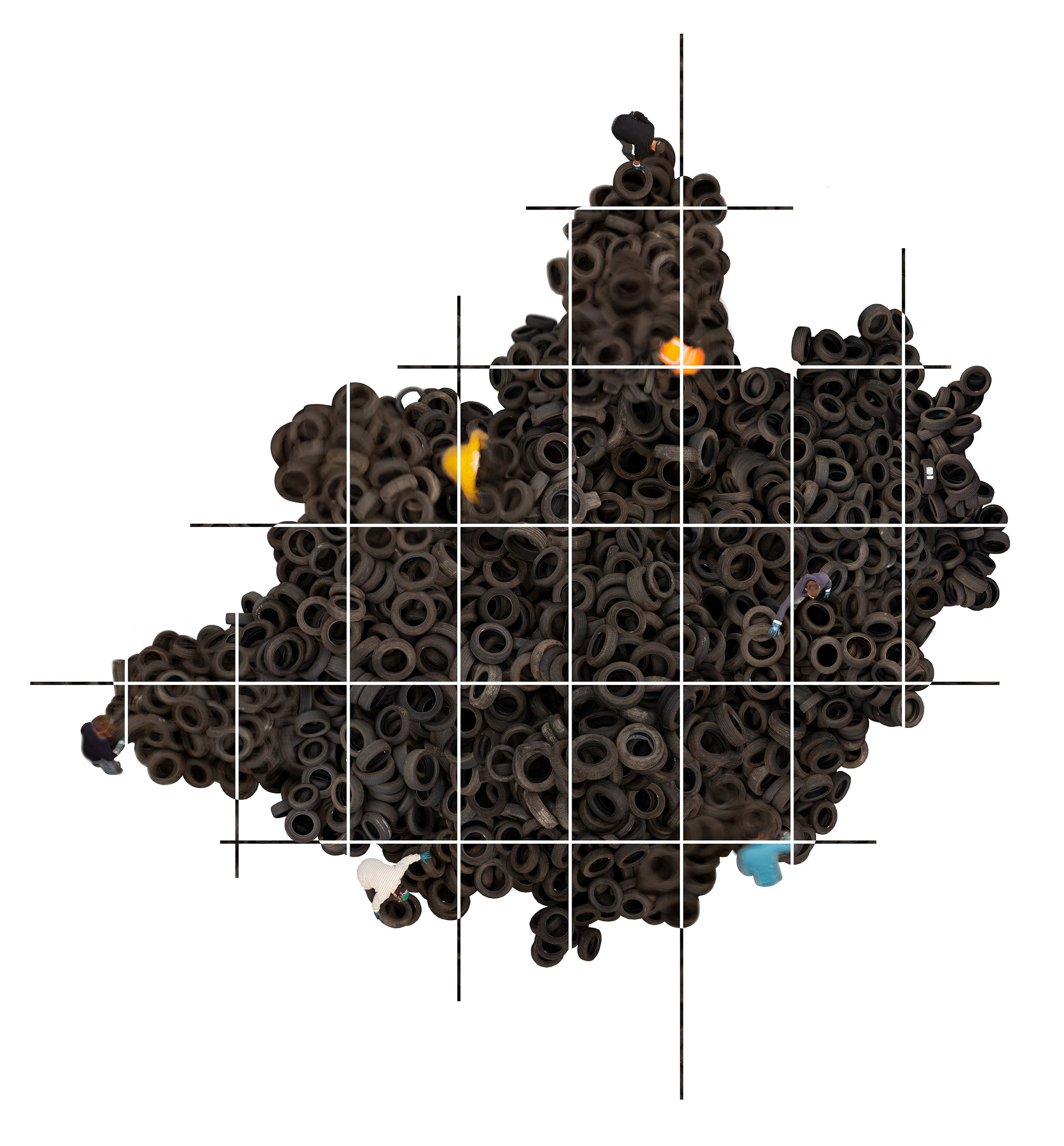
Freezers
size: 100 x 145 cm, 39” x 57”
material: Hand-cut archival pigment print
year: 2022
Fault Lines 2021 Research Symposium
Fault Lines 2020 Research Symposium
Website Research Symposium Fault Lines
Press AD
It is well known that globally we produce a huge amount of garbage but we also generate an enormous amount of image garbage. Every day millions of photographic images are being produced, shared, ignored, discarded and forgotten. The photographic image exists in a state of continual flux. through our increasing deployment of multiple captures, bursts, post-production edits, and our prolific sharing. Currently, it's often not about what we take pictures of, but about the act of taking pictures. Katrin Korfmann's research project centres on the photographic image as waste. Through ‘Wastescapes’, she asks how visual, conceptual and technical aspects of her work as a photographer can be used to critically reflect on the Wasteocene. Her research takes her into the field, to visit numerous waste processing plants, but also deeper into her own practice and her studio, where she experiments with artistic methods to generate other forms of the photographic image, through the juxtaposition and entanglement of waste processing procedures and variants of image production, editing and manifestation.
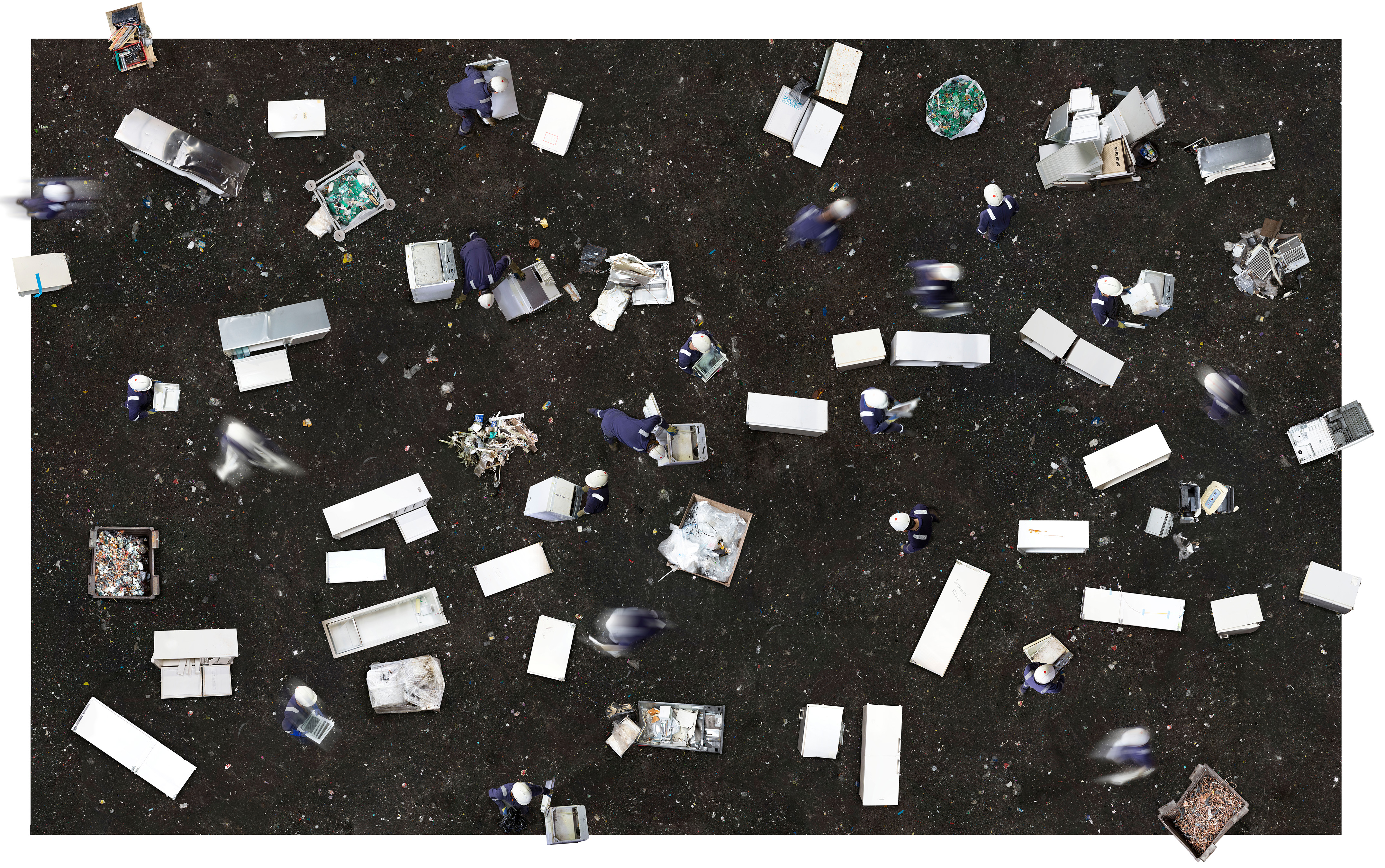
Installation view
Big Art Zaandam
Fault Lines 2021 Research Symposium
Fault Lines 2020 Research Symposium
Website Research Symposium Fault Lines
Press AD
It is well known that globally we produce a huge amount of garbage but we also generate an enormous amount of image garbage. Every day millions of photographic images are being produced, shared, ignored, discarded and forgotten. The photographic image exists in a state of continual flux. through our increasing deployment of multiple captures, bursts, post-production edits, and our prolific sharing. Currently, it's often not about what we take pictures of, but about the act of taking pictures. Katrin Korfmann's research project centres on the photographic image as waste. Through ‘Wastescapes’, she asks how visual, conceptual and technical aspects of her work as a photographer can be used to critically reflect on the Wasteocene. Her research takes her into the field, to visit numerous waste processing plants, but also deeper into her own practice and her studio, where she experiments with artistic methods to generate other forms of the photographic image, through the juxtaposition and entanglement of waste processing procedures and variants of image production, editing and manifestation.
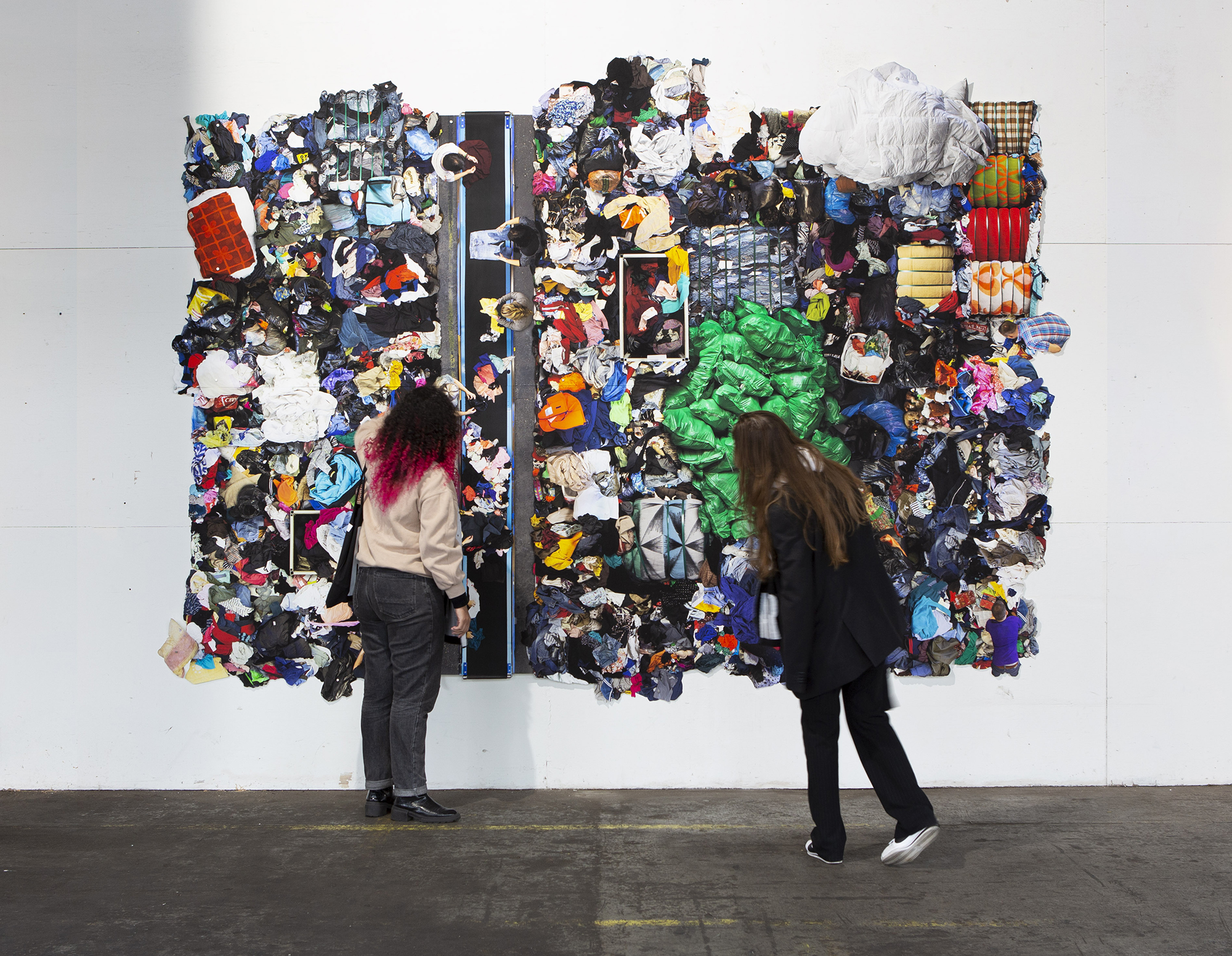
Installation view
Bradwolff Projects
Fault Lines 2021 Research Symposium
Fault Lines 2020 Research Symposium
Website Research Symposium Fault Lines
Press AD
It is well known that globally we produce a huge amount of garbage but we also generate an enormous amount of image garbage. Every day millions of photographic images are being produced, shared, ignored, discarded and forgotten. The photographic image exists in a state of continual flux. through our increasing deployment of multiple captures, bursts, post-production edits, and our prolific sharing. Currently, it's often not about what we take pictures of, but about the act of taking pictures. Katrin Korfmann's research project centres on the photographic image as waste. Through ‘Wastescapes’, she asks how visual, conceptual and technical aspects of her work as a photographer can be used to critically reflect on the Wasteocene. Her research takes her into the field, to visit numerous waste processing plants, but also deeper into her own practice and her studio, where she experiments with artistic methods to generate other forms of the photographic image, through the juxtaposition and entanglement of waste processing procedures and variants of image production, editing and manifestation.
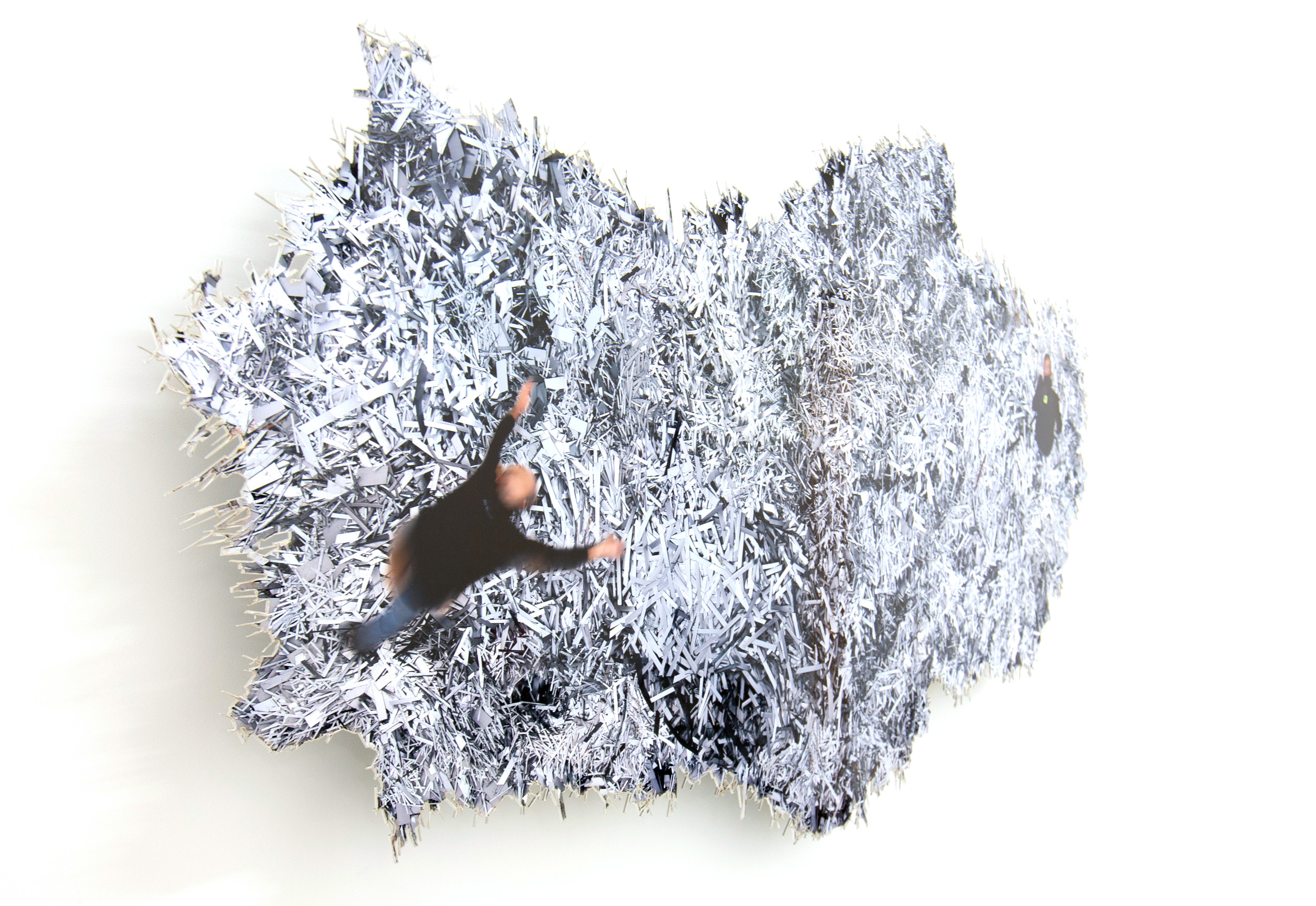
Installation view
Bradwolff Projects
Fault Lines 2021 Research Symposium
Fault Lines 2020 Research Symposium
Website Research Symposium Fault Lines
Press AD
It is well known that globally we produce a huge amount of garbage but we also generate an enormous amount of image garbage. Every day millions of photographic images are being produced, shared, ignored, discarded and forgotten. The photographic image exists in a state of continual flux. through our increasing deployment of multiple captures, bursts, post-production edits, and our prolific sharing. Currently, it's often not about what we take pictures of, but about the act of taking pictures. Katrin Korfmann's research project centres on the photographic image as waste. Through ‘Wastescapes’, she asks how visual, conceptual and technical aspects of her work as a photographer can be used to critically reflect on the Wasteocene. Her research takes her into the field, to visit numerous waste processing plants, but also deeper into her own practice and her studio, where she experiments with artistic methods to generate other forms of the photographic image, through the juxtaposition and entanglement of waste processing procedures and variants of image production, editing and manifestation.
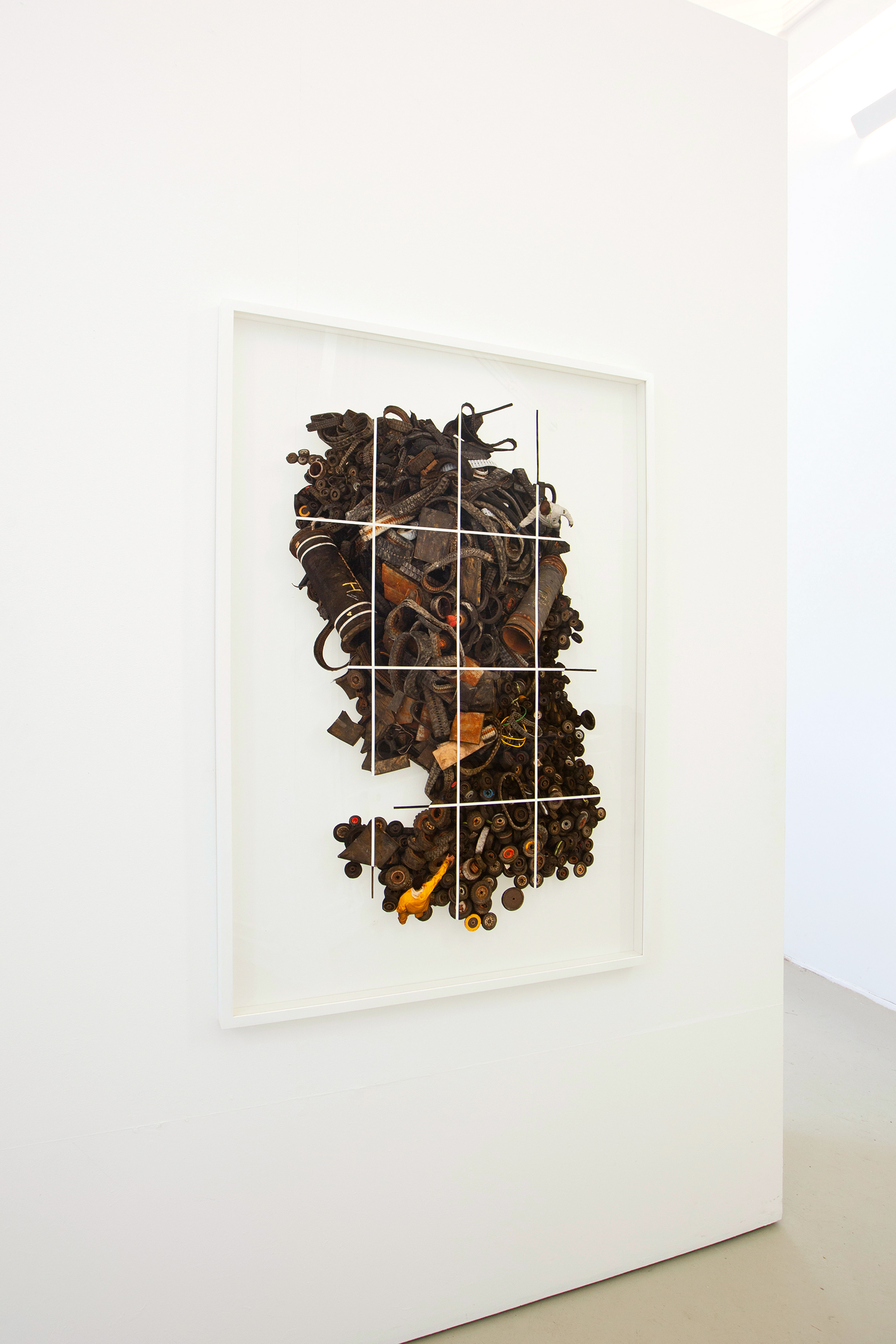
Roermond Recycling Plant, Metal
size: 60x107 cm, 24”x 42”
material: Lasercut sublimation print on aluminum
year: 2020
Fault Lines 2021 Research Symposium
Fault Lines 2020 Research Symposium
Website Research Symposium Fault Lines
Press AD
It is well known that globally we produce a huge amount of garbage but we also generate an enormous amount of image garbage. Every day millions of photographic images are being produced, shared, ignored, discarded and forgotten. The photographic image exists in a state of continual flux. through our increasing deployment of multiple captures, bursts, post-production edits, and our prolific sharing. Currently, it's often not about what we take pictures of, but about the act of taking pictures. Katrin Korfmann's research project centres on the photographic image as waste. Through ‘Wastescapes’, she asks how visual, conceptual and technical aspects of her work as a photographer can be used to critically reflect on the Wasteocene. Her research takes her into the field, to visit numerous waste processing plants, but also deeper into her own practice and her studio, where she experiments with artistic methods to generate other forms of the photographic image, through the juxtaposition and entanglement of waste processing procedures and variants of image production, editing and manifestation.
